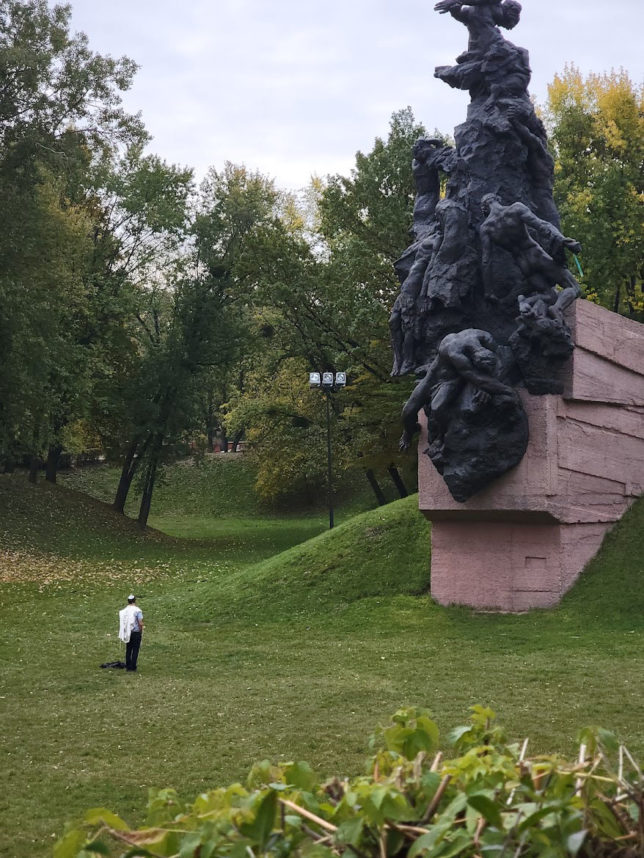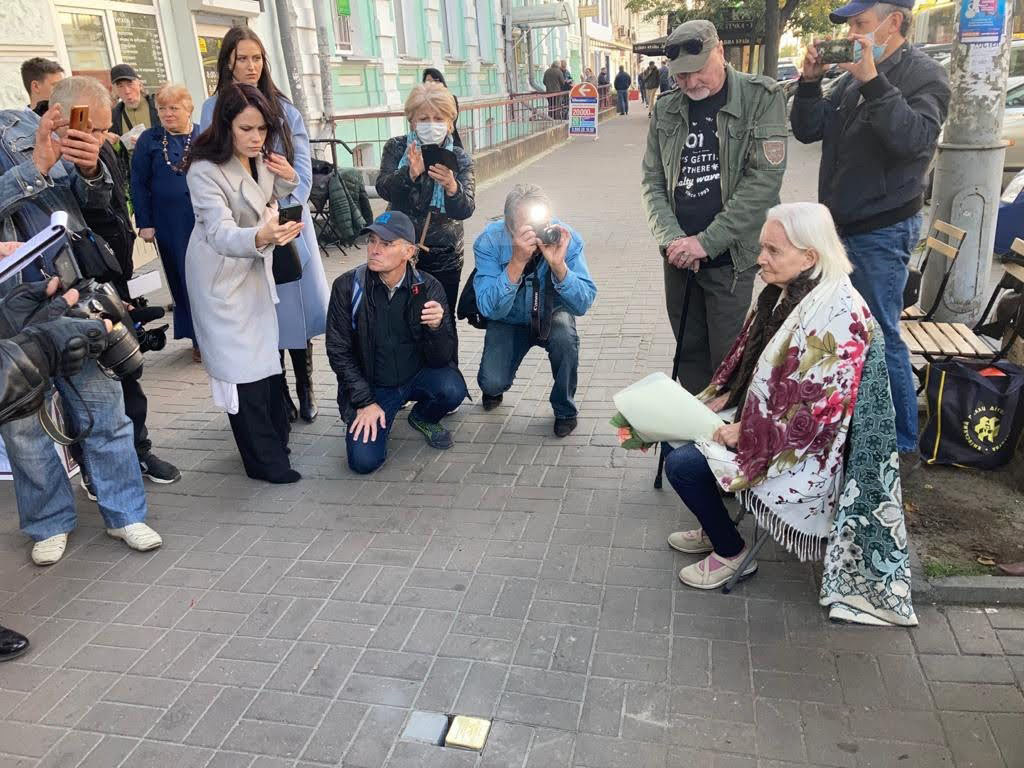 Our delegation to Kyiv in October 2021.
Photo courtesy Rabbi Andy Bachman
Our delegation to Kyiv in October 2021.
Photo courtesy Rabbi Andy Bachman Russian President Vladimir Putin’s attack on the Babi Yar site today proved to be a particularly egregious shock to people of conscience, in light of the fact that the Holocaust memorial was just dedicated in October. Not only does war bring death and destruction, the immoral loss of innocent life, grotesque and tragic in its own right. But there is something particularly galling about at attack on a site that commemorates the genocidal slaughter of more than 100,000 innocents in the European continent’s last war, 80 years ago.
Memorials are meant to be, like the name Yad Vashem signifies, everlasting. How are we to forge paths of reconciliation, understanding and lasting peace upon the ashes of memorials themselves?
Putin’s brazen assault on Ukraine has me thinking of friends I made in Kyiv last October, where I traveled with several New York state and city leaders for the 80th anniversary commemoration of the Babi Yar massacre, the Nazi massacre of 33,771 Jews on September 29-30, 1941. The site had been a memory wasteland of the Holocaust until last year, when the Ukrainian government made the critically important decision to lean in to this dark history, testify to its own people’s complicity in Nazi genocide, and create a new way forward in history.
As guests of the Ukrainian government and the Assembly of Nationalities of Ukraine, we met members of the Ukrainian parliament, journalists, human rights and democracy activists and artists, and heard a consistent message of the Ukrainian desire to strengthen its democratic institutions, to orient itself to freedom of expression and openness to other democracies in the world.
We attended the memorial event presided over by President Volodomyr Zelensky of Ukraine, President Isaac Herzog of Israel and President Frank-Walter Steinmeier of Germany, where the Munich Philharmonic played Shostakovich’s 13th Symphony, “Babi Yar,” based on Yevtushenko’s monumental poem about the massacre. 
People of all faiths prayed and meditated at Marina Abromovic’s chilling installation, “Crystal Wall of Crying,” and as a rabbi, I said the Mourners’ Kaddish, one of Judaism’s most sacred prayers, at the killing site where images of Ukrainian Jewry were projected on to the trees in the ravine where by war’s end, more than 100,000 Jews and others were brutally murdered.
We met with leaders of the Ukrainian Church, laid wreaths at a memorial to Ukrainian soldiers who died in defense of their eastern border, and again recited prayers of mourning and consolation at the Holodomor memorial to the 3.2 million Ukrainians starved to death by Stalin in 1932-33.
It is hard to describe how deeply moving these encounters were. And while bombs drop on cities throughout Ukraine, our delegation’s WhatsApp lights up with messages of concern, strength and love to our new friends and allies who are experiencing a potential European continental war that was unimaginable just a few years ago.
Peace and reconciliation begin not at the negotiating table but at such intimate encounters that we experienced: breaking bread, speaking openly, grieving and hoping together. War and those who would wage it disrupt these redemptive acts of peace. War is the dystopian underbelly of the best of the human condition, which sees each of us as made in the Divine image, seeking peace, pursuing it and reaching for a mutuality of understanding.
One of the most moving moments of the trip occurred when our delegation stumbled upon the dedication ceremony of a Tripping Stone, a small brass marker placed in front of the home where a Jewish family was taken by Nazis, marched to the ravine at Babi Yar, and killed. There we met Raisa Mastrenko, now an elderly Jewish resident of Kyiv who was pulled from the ravine by her non-Jewish grandmother, rescued and hidden for the duration of the war. 
These unfathomable acts of bravery and moral heroism are precisely why these delegations are so important. They are also absolutely necessary acts of contemporary resistance in our fraught world of strongmen who would attempt to crush the indomitable human urge for freedom. Tyrants and opponents of open, liberal democracy oppose remembrance for the purposes of erasure. They seek a white-washing of history that is the antithesis of progress. When Bryan Stevenson of the Equal Justice Initiative in Montgomery, Alabama traveled to Berlin and saw the Tripping Stone memorials to Jews taken from their homes during the Holocaust, it inspired him to create his Lynching Memorial. And it is the simple impulse for erasure that seeks to prevent the removal of Confederate statues or vandalizes signs honoring slain civil rights leaders. The noble fight for historical truth and reconciliation is shared by all people of goodwill.
Tyrants like Putin want us to forget… It’s precisely why our ongoing, shared testimony is so necessary.
As a Jew and a rabbi serving his community, I teach the critically important lesson of what it means to both remember and never forget. It is why I traveled to Kyiv and why, each year, I travel to Belarus with a small group of Jewish leaders to raise memorials to the destroyed Jewish communities of that region as well. Each requires an active effort by Jews and non-Jews to remember together; each trip is a flame of hope in a dark and dangerous world. If we are to remember the worst expressions of hatred and violence perpetrated against our own people, we must also never forget the suffering of others in our world. Tyrants like Putin want us to forget. They seek the disruption of our remembrances in order to build their dangerous new world order on the ash-heap of history. It’s precisely why our ongoing, shared testimony is so necessary.
On my last day in Kyiv, I rose early and went to pray at the ravine.
But as I worked my way through the blessings and prayers, an unusual thing happened. My voice gave way to the voices of the generations. In the black ink of the Hebrew letters on the page were the voices of those who came before me, whenever and wherever that was. They prayed with me; they argued and cried out to God and shed tears with me in the ravine that morning, protesting the radical and irredeemable injustice of the Holocaust and wars of tyrants while also promising, yet again, to “love the Eternal your God with all your heart, all your soul and all your strength.”
Those who were murdered in Babi Yar did not die in vain. And if we do what we are called upon to do in this world, to remember and not forget, their memory and ours will endure.
Those who were murdered in Babi Yar did not die in vain. And if we do what we are called upon to do in this world, to remember and not forget, their memory and ours will endure. Going forth and transcending the past is not an abrogation but a continuation; it is not an end but an ongoing. Going forth is not a destination but a journey, in every generation, for a world founded on love, justice and peace.
Just as I refuse to forget my Jewish history, I am reminded on such delegation visits that I share this world with other people and faiths and nations of good will who seek to tell their own stories, remember their own suffering, and find in one another the strength to prevail and even triumph.
It breaks my heart to think of what memorials will be raised to commemorate the senseless deaths of Putin’s senseless war. But we will remember, all of us, and together we will fight to build a better, more peaceful world.
Rabbi Andy Bachman is executive director of the Jewish Community Project of Lower Manhattan.






















 More news and opinions than at a Shabbat dinner, right in your inbox.
More news and opinions than at a Shabbat dinner, right in your inbox.